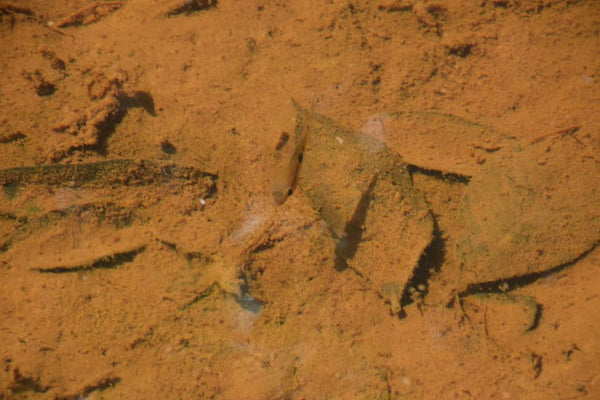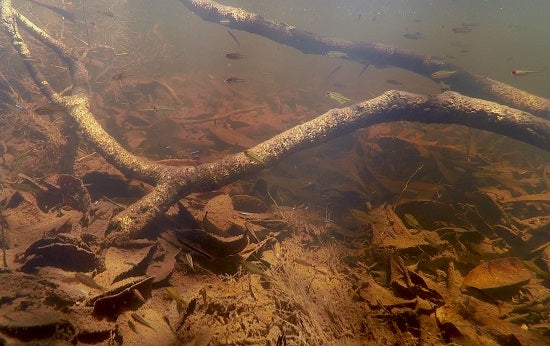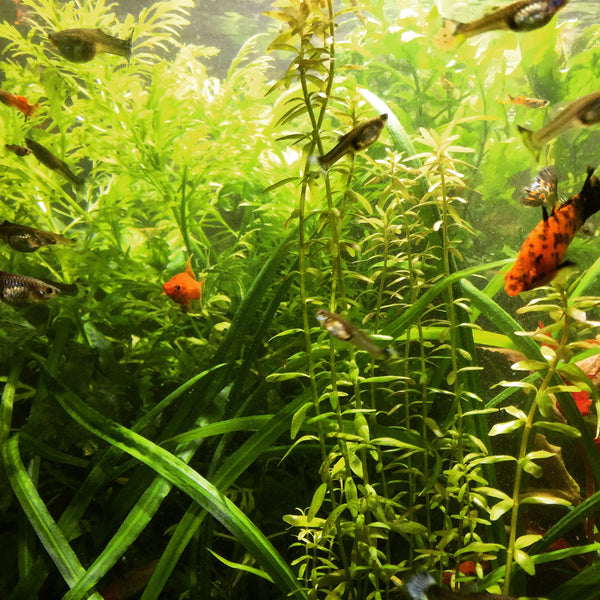- Continue Shopping
- Your Cart is Empty
"Mulm's the word." Or, is it "detritus?" Or, is it food, or...?
As a "student of all things aquatic", and a lifelong aquarist, like most of you, I've formulated a lot of opinions about hobby stuff over the years. I suppose, much of my "indoctrination" into the hobby was based on the time-honored traditions and mindsets that we took for granted for so long.
I remember as a kid reading fish books. Like, I read all of the ones I could get my hands on. And I read every word. In fact, those books taught me to be a better reader!
Some were my dad's (yeah, he was a fish geek, too..it's genetic!), others were from the public library, or my own growing collection that I purchased at pet shops and fish stores. Most were "vintage", re-issues from the late 1950s and 1960's, because that was when the bulk of the major, amazing books on tropical fishes were published up until that point.
And of course, the classics, like Innes' "Exotic Aquarium Fishes" rang just as true then as they do now!

They were magical.
They reflected the time that they were published. A time of burgeoning popularity for the tropical fish hobby. A time when technology and technique were starting to really "meld" together to coalesce into the modern aquarium practices we work with today.
It was a "Golden Age" for the tropical fish hobby, for sure. And you could sense it just by reading these charming books. You could almost feel the metal frame, slate-bottomed tanks of the day!

I read every book, from cover to cover. Memorized every passage. Savored every image. Studied each caption. Coveted every fish! Studied all I could about the fishes I kept in my collection. Dreamed about ones I wished I had.

There was something very matter-of-fact about the language in those books. The straightforward, "this-is-how-it's-done" tone based on what you could tell was firsthand knowledge of the masters of the past and the "present"- preserved and passed on to future generations of hobbyists, like myself.
The vocabulary was rich and fascinating.
One word I remember seeing in many of these books was "mulm." It was a funny word. A sort of 1950's-60's-style "catch-all" expression for "stuff" that accumulates at the bottom of an aquarium.
It was- is- quite appropriate, and surprisingly descriptive!
To me,"mulm" is essentially the equivalent of "detritus", which is used in the modern aquarium hobby extensively to describe the "solid material that accumulates at the bottom of an aquarium as the end product of biological filtration."
"Mulm", however, is a bit more...charming- right?
In a word, it's a "matrix" of stringy algae, biofilms, and fine particles of "stuff" that tends to accumulate here and there in healthy aquariums, What's cool about this stuff is that, not only do you see it in aquariums- you see it extensively in natural ecosystems, such as Amazonian streams, Asian peat swamps, and other habitats.

In the case of a "botanical" style aquarium, "mulm" is also comprised of bits and pieces of the broken-down leaves and botanicals we place in our tanks. It's an integral component of what we call an "enriched" substrate in our aquariums. As botanicals break down- just like in Nature- they create a diverse matrix of partially decomposing plant materials, pieces of bark, bits of algae, and some strings of biofilm.
Stuff that sounds diverse, yet benign.
Detritus, a more "cocktail party smart" word, seems to have a bit more of a sinister connotation to it. The definition is a bit more precise:
"Detritus is dead particulate organic matter. It typically includes the bodies or fragments of dead organisms, as well as fecal material. Detritus is typically colonized by communities of microorganisms which act to decompose or remineralize the material." (Source: The Aquarium Wiki)
Woah!
It's one of our most commonly used aquarium terms...and one which, well, quite frankly, sends shivers down the spine of many aquarium hobbyists. And judging from that definition, it sounds like something you absolutely want to avoid having in your system at all costs. I mean, "dead organisms" and "fecal material" is not everyone's idea of a good time, ya know?
Literally, shit in your tank, accumulating. Like, why would anyone want this to linger- or worse- accumulate- in your aquarium?
Yet, when you really think about it and brush off the initial "shock value", the fact is that detritus is an important part of the aquatic ecosystem, providing "fuel" for microorganisms and fungi at the base of the food chain in aquatic environments. In fact, in natural blackwater systems, the food inputs into the water are channeled by decomposers, like fungi, which act upon leaves and other organic materials in the water to break them down.

And the leaf litter "community" of fishes, insects, fungi, and microorganisms is really important to these systems, as it assimilates terrestrial material into the blackwater aquatic system, and acts to reduce the loss of nutrients to the forest which would inevitably occur if all the material which fell into the streams was washed downstream!

That sounds all well and good and well, grandiose, but what are the implications of these processes- and the resultant detritus- for the closed aquarium system?
In years past, aquarists who favored "sterile-looking" aquaria would have been horrified to see this stuff accumulating on the bottom, or among the hardscape. Upon discovering it in our tanks, it would have taken nanoseconds to lunge for the siphon hose to get this stuff out ASAP!
In our world, the reality is that we embrace this stuff for what it is: A rich, diverse, and beneficial part of our microcosm. It provides foraging, "Aquatic plant "mulch", supplemental food production, a place for fry to shelter, and is a vital, fascinating part of the natural environment.

It is certainly a new way of thinking when we espouse not only accepting the presence of this stuff in our aquaria, but actually encouraging it and rejoicing in its presence!
Why?
Well, not because we are thinking, "Wow, this is an excuse for maintaining a dirty-looking aquarium!" No.
We rejoice because our little closed microcosms are mimicking exactly what happens in the natural environments that we strive so hard to replicate. Granted, in a closed system, you must pay greater attention to water quality, but accepting decomposing leaves and botanicals as a dynamic part of a living closed system is embracing the very processes that we have tried to nurture for many years.

Sure, it's a very different aesthetic than what we have been indoctrinated to appreciate over the years: Brown water, leaves, stringy algae films, and bits of botanical debris. We may not want to have an entire bottom filled with this stuff...or, maybe we might!

Think about it. Much of this material is not only already broken-down or rendered "inert" by beneficial bacteria and microorganisms which live within the "matrix"- it's processed into a more easily-assimilated form for other aquatic animals.
Check your water parameters. Are you seeing surging nitrate levels? Do you have any detectible ammonia or nitrite? Are the fishes healthy, relaxed, and active? If the answer to the first two questions is "no", and the last is "yes"- and I suspect that it will be in well-managed systems- then perhaps it's time to enjoy whats happening in your aquarium!
If you are having issues with ammonia/nitrite, you have more problems than just some detritus, IMHO. If you have some significant accumulations of nitrate, it's important to review the husbandry processes you employ. I know from personal experience in both freshwater and reef/coral propagation systems that you can have significant quantities of detritus "in play" without deteriorated water quality.

It's a balance- like everything else in our aquariums. I know that sounds a bit like a "cop out"- but it's a reality.
To accept and understand that the aesthetic of a heavily botanical-influenced system is simply different than what we've come to perceive as "acceptable" in the general aquarium sense.
It's not for everyone.
It's not something that we are used to seeing. However, the feedback we've been getting from you- our customers- regarding the systems you've set up in this fashion is that they have created an entirely new perception and understanding of a freshwater aquarium. They've enabled us all to try a completely different aesthetic experience, to understand processes that occur naturally, which are of great benefit to the fishes we keep.

Attempting to keep our tanks essentially "sterile" is an almost futile, and ultimately detrimental practice, IMHO. The idea of creating "unnaturally clean" conditions likely results in some microorganisms struggling to find food. Now our aquariums are not absolutely "natural", open systems. However, embracing some natural processes and emulating functions of wild ecosystems might be a key "unlock" in order for certain organisms to survive and thrive long term.
Detritus/mulm- whatever you call it- serves as a food source- and a food "processing/producing" source for fishes and the other aquatic organisms which live in our tanks.

And yeah- detritus is found in gut content analysis of many fishes. Here is a charming passage, with a rather comprehensive description of gut contents from one of our fave fishes, the Cardinal Tetra:
"The stomach content was categorized as “detritus”... when it was found in sufficient quantities within the proper stomach, so that the conclusion of “detritus-feeding” appeared as a realistic proposition...the hind gut, filled with the digested material, practically always contained particles that could be listed as detritus. In addition, small quantities of detritus particles remain from prey guts, and/or enter the stomach when the fish are browsing for small prey over the surface of plants, litter and woods."

So, yeah- use common sense in stocking, feeding, and maintaining your aquarium However, I think stressing a bit less about keeping our aquariums completely spotless is a really good step to take.
I think so. Really.
"Remove detritus from your aquarium regularly..."
Is this another one of those long-held "aquarium truisms" that, for 90% of what we do is absolutely the correct way to manage our tanks, but which, for a small percentage of aquarists with the means, curiosity and inclination to experiment, could actually ultimately prove detrimental in some way?
Like, actually letting some stay "in play?"

Okay, I know that now a bunch of you are thinking, "This guy IS nuts. Letting detritus accumulate in an aquarium is bad news. A recipe for problems- or worse. And not only that, he has no idea of the implications of what he's suggesting."
Well, as far as the first part of your thought- Yeah, I could be a bit "crazy."
On the other hand, I think I do have some idea of the implications of what I'm postulating here. First off, remember, I'm not suggesting that everyone throw away their siphons, disregard water exchanges, and just allow shit (literally!) to accumulate in their aquarium substrate in the interest of creating a "food web."
No sir.
What I am curious about is if there is some benefit in a botanical, blackwater system, of encouraging a bit more fungal and microbial growth, utilizing, among other things, the organic detritus that inevitably is produced in a well-managed. well-populated aquarium.
I mean, if you're doing water changes and removing uneaten food, dead fishes, aquatic plant leaves, etc., you're already significantly reducing the "food inputs" available to the organisms on the low end of the food chain, right? In a typical aquarium, well-maintained with regular water changes and removal of detritus, our fishes are almost 100% dependent upon us to provide food, right?
We do have a sort of a "food web" in our tanks, right? However, we seem to regularly "dissect" part of it with our militant stance about not letting this stuff accumulate at all.
I know that when I used to be I the coral propagation business, we experienced challenges early on with color and growth of our coral frags. I mean, we had great husbandry (by typical standards), insane water movement, protein skimming, and almost "clinically sterile" water conditions! It was frustrating. We tried everything- why wasn't our coral growing well?
It was only when we had a protracted period of time where circumstances prevented us from our usual hyper husbandry that things improved.. Yeah- Lo and behold, once we allowed some detritus to remain in our systems, we grew corals more quickly, healthily, and colorfully.
There IS something to this concept!

I also believe that leaving a bit of detritus in the system- say, in the leaf litter bed, helps to "fuel" the fungal and microorganism growth that forms the basis of our little ecosystems. I mean, think of some possible benefits to our aquariums. Having a more diverse, healthy assortment of fungi and microorganisms could lead ultimately to a more stable, more efficient aquarium, right?

Yeah, I think so!
If you're not decimating a large percentage of the ecosystem's primary decomposers and food sources weekly with ultra-intense maintenance, wouldn't there perhaps be some advantages?
And don't a lot of young fishes consume "infusoria" organisms as a part of their initial diet? Aren't these organisms found in detritus? Wouldn't it make sense to have larger populations of some of these organisms available to our fishes at all times in the aquarium to supplement our artificial diets?

Could the "fry-rearing system of the future" be a tank with a big bed of decomposing leaf litter and a terrestrial soil substrate?
Yeah, I believe it could.
In the meantime, there are the aesthetics of more natural aquariums that we proffer, and the mental shifts we need to make to accept and understand a different "look" and function.
Perhaps, we're somehow drawn to their earthy, "organic" feel?

I'm not sure. But I do know that I'm enjoying my tanks, and so are many of you who have tried this approach. Embracing- not fighting- Nature in a more complete sense just might be "the next big breakthrough" in aquarium keeping.
Or, it might simply be an idea that's always been right in front of our noses, which we just resisted for a generation or two.
Evolution? Perhaps.
Stay persistent. Stay engaged. Stay confident. Stay open-minded. Stay unafraid...
And Stay Wet.
Scot Fellman
Tannin Aquatics
3 Responses
Geraldo Tadeu Rodrigues
Estou impressionado com esse artigo!
Tenho um lago ornamental e não retiro os detritos sólidos a muito tempo. Meu lago vai muito bem! Tenho peixes saudáveis, muitas plantas e um grande filtro biológico que nunca foi limpo.
Deus abençoe você!
Tiff Gregers
How interesting that you discuss what accumulates in healthy aquariums. I want to buy my first fish this month. I will find a reputable aquarium tropical fish place in my area to assist. http://www.neptunestropical.com/tropical-aquarium-fish
Jon Webb
Hear, hear on mulm. I’ve bred wild discus in a “mulmy “ tank. Not like the bare-bottom discus tanks of the 90’s. But LEDs are a great leap forward for planted environments.









Scott Fellman
Author